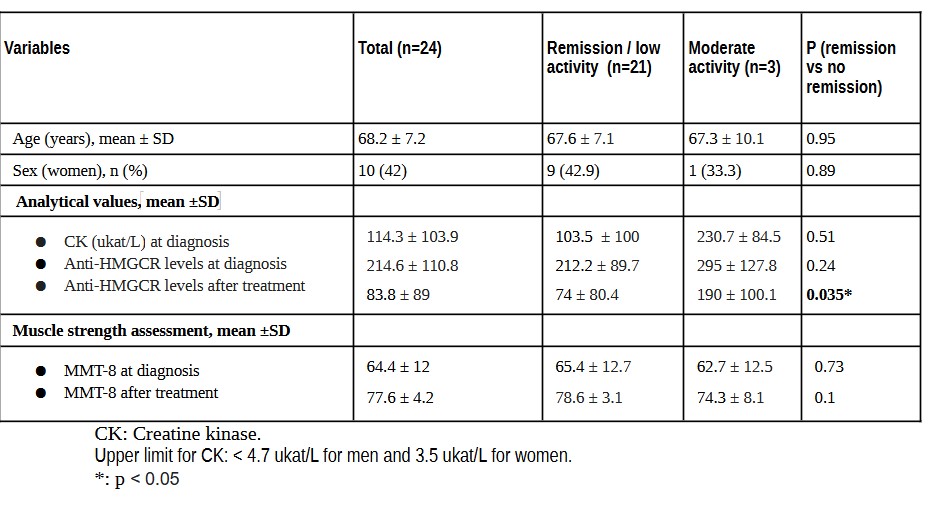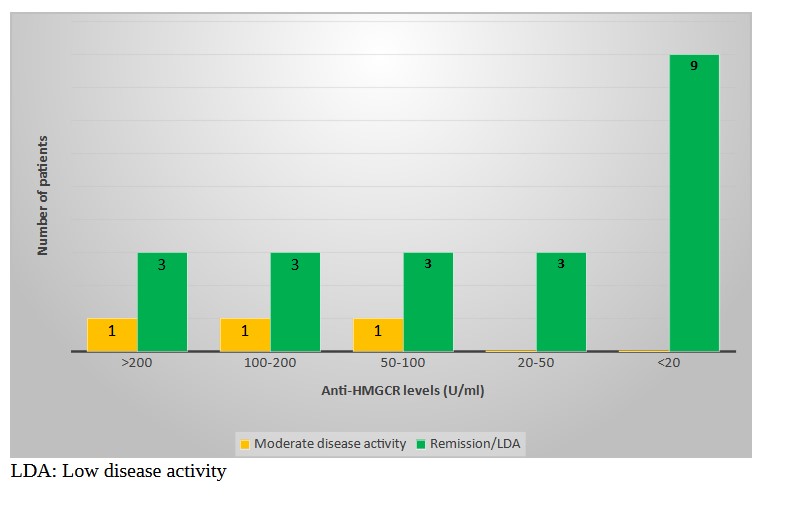Session Information
Date: Monday, November 13, 2023
Title: (1155–1182) Muscle Biology, Myositis & Myopathies – Basic & Clinical Science Poster II
Session Type: Poster Session B
Session Time: 9:00AM-11:00AM
Background/Purpose: Statin-induced immune-mediated necrotizing myopathy (IMNM) is associated with anti-3-hydroxy-3-methylglutaryl-CoA reductase (HMGCR) autoantibodies. It is characterized by elevated creatine kinase (CK) levels, and severe muscle weakness. Measuring disease activity is problematic, since it is challenging to differentiate it from damage. The utility of the quantitative analysis of anti-HMGCR autoantibodies during the follow-up has not been thoroughly studied.
Our aum was to assess the usefulness of measuring the levels of anti-HMGCR autoantibodies in relation to response to treatment.
Methods: We included patients all consecutive patients diagnosed with statin-induced IMNM according to the definition of the European Neuromuscular International Workshop 2016 and positivity for anti-HMGCR autoantibodies in two centers from Spain and Sweden from January 2017 to November 2022. All patients were followed for at least 3 months to be included. Clinical data was extracted retrospectively from the patients’ clinical records. Remission was defined as no disease activity assessed by expert rheumatologists according to 2016 ACR/EULAR response criteria in myositis. Moderate and high disease activity was defined when physician global activity score was higher than 2 or 3 (on a Likert scale) respectively . Anti-HMGCR autoantibodies level was measured at the time of diagnosis and at a variable period of time after treatment. Results were obtained using the chemiluminescence immunoassay (CLIA) method. Negative anti-HMGCR was considered as levels lower than 20 U/ml.
Results: Our group combined of 24 patients. Main features of the patients are summarized in the TABLE. 21 (87.5%) patients reached clinical remission or low disease activity. However, 3 patients (12.5%) remained with moderate activity of the disease. None of the patients had high disease activity. Anti-HMGCR levels at diagnosis were higher than 100 U/ml in 23 patients (95.8%) and above 200 in 11 patients (45.8%). However, anti-HMGCR levels after treatment were significantly lower in patients in remission (p=0.035). Numeric levels in patients at diagnosis of the disease and after treatment are shown in the FIGURE. Most of the patients at diagnosis (with high activity of the disease) had high anti-HMGCR levels (22 patients, 91.7% had levels above 100 U/ml). After treatment, most patients in remission had low (n=3, 14.3%) or negative (n=9, 42.9%), while patients with moderate activity had higher levels (n=2, 66.7% with levels above 100 U/ml). However, 6 patients in remission (28.6%) still had levels above 100 U/ml.
Conclusion: Anti-HMGCR autoantibodies levels evaluation can be used in parallel with other tools to accurately measure disease activity in patients with statin-induced IMNM. However, more studies are needed to confirm these results.
To cite this abstract in AMA style:
Martinez-Lopez D, Corrales Selaya C, Prieto-Peña D, Szczesny P, Notarnicola A, Lopez-Hoyos M, Blanco R, Lundberg I, Dastmalchi M. Anti-HMGCR Autoantibody Levels in the Follow-up of Statin-induced Immune-mediated Necrotizing Myopathy: Multicentric Study of 24 Patients [abstract]. Arthritis Rheumatol. 2023; 75 (suppl 9). https://acrabstracts.org/abstract/anti-hmgcr-autoantibody-levels-in-the-follow-up-of-statin-induced-immune-mediated-necrotizing-myopathy-multicentric-study-of-24-patients/. Accessed .« Back to ACR Convergence 2023
ACR Meeting Abstracts - https://acrabstracts.org/abstract/anti-hmgcr-autoantibody-levels-in-the-follow-up-of-statin-induced-immune-mediated-necrotizing-myopathy-multicentric-study-of-24-patients/


